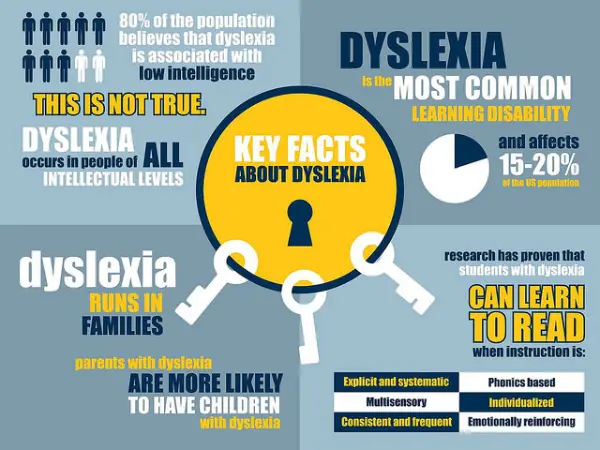What is Dyslexia? Signs & Symptoms Across Ages
April 21, 2025 | By Clara Finch
Reading is fundamental to learning and navigating the modern world. Yet, for many intelligent and capable individuals, reading presents unexpected and persistent challenges. If you've ever wondered about ongoing struggles with reading or spelling, either in yourself or someone you care about, you might be asking: What exactly is dyslexia? This article aims to demystify dyslexia, providing a clear definition, outlining its core characteristics, and detailing the common signs and symptoms across different age groups. Understanding dyslexia is the crucial first step towards finding clarity and appropriate support. You might even start exploring options like understanding the potential need for a dyslexia test.

What Exactly is Dyslexia? Beyond the Common Myths
Let's start with a clear dyslexia definition.
Defining Dyslexia: A Neurological Learning Difference
Dyslexia is widely recognized as a specific learning disability that is neurological in origin. This means it stems from differences in how the brain processes language. Crucially, dyslexia is characterized by difficulties with accurate and/or fluent word recognition and by poor spelling and decoding abilities. These difficulties typically result from a deficit in the phonological component of language (the sound structure of words) that is often unexpected in relation to other cognitive abilities and the provision of effective classroom instruction. It's a learning difference, not a sign of low intelligence or lack of effort.
Common Misconceptions vs. Reality (Intelligence, Vision, Reversals)
Several myths surround dyslexia that need clarification:
- Myth: Dyslexia is linked to low intelligence. Reality: Dyslexia affects individuals across the full spectrum of intelligence. Many people with dyslexia are highly intelligent, creative, and successful.
- Myth: Dyslexia is a vision problem, like seeing letters backward. Reality: While some individuals with dyslexia might reverse letters (like 'b' and 'd') especially when young, dyslexia is fundamentally a language-processing issue, not a problem with eyesight itself. Vision problems should be checked separately but don't cause dyslexia.
- Myth: People with dyslexia are lazy or not trying hard enough. Reality: Individuals with dyslexia often work much harder than their peers to achieve similar reading and writing results. Their challenges are real and neurological.
Is Dyslexia Classified as a Specific Learning Disability?
Yes, dyslexia is one of the most common types of specific learning disability (SLD). Understanding this classification helps in accessing appropriate educational support and accommodations when a formal assessment is conducted.
Core Characteristics of Dyslexia: Understanding the Underlying Difficulties
What are the core characteristics of dyslexia? While it manifests differently in each person, several underlying difficulties are common.

Challenges with Phonological Awareness (Sounds in Language)
This is often considered the hallmark of dyslexia. Phonological awareness refers to the ability to recognize and manipulate the sounds within spoken words. Difficulties might include:
- Trouble recognizing rhymes (e.g., cat, hat, bat).
- Difficulty breaking words down into syllables (e.g., "but-ter-fly").
- Struggling to blend sounds together to make a word (e.g., /c/ /a/ /t/ -> "cat").
- Difficulty identifying the first, middle, or last sound in a word.
Difficulties in Decoding and Accurate Word Recognition
Decoding is the process of matching letters to sounds and blending them to read words. Individuals with dyslexia often struggle with:
- Learning letter names and their corresponding sounds.
- Reading single words accurately, especially unfamiliar ones.
- Slow and effortful word recognition.
Impacts on Reading Fluency and Comprehension
Because decoding is often slow and laborious, reading fluency (reading smoothly, accurately, and with appropriate expression) is usually impacted. This, in turn, can hinder reading comprehension, as so much mental energy is spent on figuring out the words that less is available for understanding the meaning of the text.
Common Spelling and Written Expression Issues
Dyslexia frequently affects spelling. Common spelling errors might include phonetic misspellings (spelling words exactly as they sound, e.g., "sed" for "said"), letter omissions or additions, or inconsistent spelling of the same word. Difficulties can also extend to organizing thoughts for writing.
Recognizing the Signs: Dyslexia Symptoms in Preschoolers (Ages 3-5)
Wondering about early signs in your preschooler? While a formal diagnosis isn't typically made at this age, certain indicators might suggest potential risk factors. Observing these preschool dyslexia signs can prompt further monitoring.
Delayed Speech or Trouble with Pronunciation
- Late talking compared to peers.
- Difficulty pronouncing multi-syllable words (e.g., "spaghetti" might become "pisghetti").
- Persistent "baby talk."
Difficulty Learning Nursery Rhymes or Recognizing Letters
- Struggling to learn or remember nursery rhymes or songs with rhyming patterns.
- Trouble recognizing the letters in their own name.
- Difficulty learning and remembering the alphabet.
A Family History of Reading Difficulties
- Dyslexia often runs in families. If parents or siblings have dyslexia or significant reading/spelling challenges, the child might have a higher risk.
Dyslexia Indicators in School-Aged Children (Ages 6-12)
Are you noticing reading difficulties in your school-aged child? As formal reading instruction begins, the signs of dyslexia often become more apparent. These childhood dyslexia symptoms warrant attention.
Slow, Labored, or Inaccurate Reading Aloud
- Reading much slower than peers.
- Making frequent mistakes, guessing at words, or skipping words altogether.
- Sounding out words very slowly or being unable to blend sounds.
Trouble Remembering Sequences (like days of the week)
- Difficulty remembering sequences like the days of the week, months of the year, or multiplication tables.
Persistent Spelling Errors and Messy Handwriting
- Consistently poor spelling, even with common words.
- Difficulty learning spelling rules.
- Handwriting might be poorly formed or inconsistent.
Avoiding Reading Tasks
- Complaining about reading, saying it's "boring" or "too hard."
- Finding excuses to avoid reading aloud or doing reading homework.
- Experiencing frustration or anxiety around reading activities. A preliminary check like an online dyslexia test might offer some initial insights into potential risk.
Identifying Dyslexia Symptoms in Teenagers (Ages 13-18)
Could ongoing academic struggles point to dyslexia in your teen? While some coping mechanisms may have developed, teen dyslexia challenges often persist and can manifest in new ways.
Continued Slow Reading Speed and Comprehension Issues
- Reading significantly slower than peers, making timed tests challenging.
- Needing to re-read material multiple times to understand it.
- Difficulty grasping the main idea or summarizing text.
Difficulty Learning Foreign Languages
- Finding foreign language classes particularly challenging due to the heavy emphasis on sound-symbol correspondence and grammar rules.
Challenges with Summarizing or Outlining Text
- Struggling to identify key points and organize information from readings for essays or reports.
Trouble with Time Management and Organization for Assignments
- Difficulty estimating how long tasks will take.
- Struggling to break down large assignments into smaller steps.
- Messy notes or backpack.
Signs of Dyslexia in Adults: It's Never Too Late to Understand
Have you always struggled with reading and wondered why? Dyslexia doesn't disappear after childhood. Recognizing adult dyslexia indicators can be empowering. These signs might point towards an underlying adult learning disability.

Persistent Reading and Spelling Challenges
- Reading slowly and tiring easily when reading.
- Avoiding reading for pleasure or struggling with workplace reading demands.
- Ongoing difficulties with spelling and written grammar.
Avoiding Tasks Requiring Reading or Writing
- Preferring jobs or tasks with minimal reading/writing.
- Feeling anxious about situations requiring public reading or writing (e.g., filling out forms).
Difficulty Remembering Names or Directions
- Trouble recalling names of people or places.
- Struggling to follow multi-step verbal directions.
Strengths Often Lie in Areas Like Problem-Solving or Creativity
- Many adults with dyslexia excel in areas that don't heavily rely on traditional literacy skills, such as visual thinking, spatial reasoning, problem-solving, entrepreneurship, or the arts. They often develop strong compensatory strategies. It's never too late to explore resources like an online dyslexia screening for better self-understanding.
Why Early Recognition of Dyslexia Signs Matters
Identifying potential signs of dyslexia early, or even later in life, is crucial for several reasons.
Impact on Academic Achievement and Self-Esteem
- Without understanding and support, ongoing struggles can lead to academic underachievement, frustration, and low self-esteem. Students might wrongly conclude they aren't smart.
The Importance of Timely Support and Intervention
- Early identification allows for timely access to appropriate support and evidence-based intervention strategies. These strategies can significantly improve reading and spelling skills.

Understanding Leads to Empowerment
- Knowing that the challenges stem from a specific learning difference like dyslexia, rather than a lack of intelligence or effort, can be incredibly validating and empowering for both the individual and their family. It shifts the focus from blame to finding solutions.
Understanding Dyslexia is the First Step
Dyslexia is a common, brain-based learning difference that primarily affects reading and spelling skills. It's not related to intelligence, vision, or effort. The signs of dyslexia can manifest differently across various ages, from difficulties with rhymes in preschool to persistent reading slowness in adulthood. Recognizing these potential indicators is the vital first step towards seeking understanding, appropriate support, and effective strategies.
If you recognize some of these signs in yourself, your child, or someone you know, and feel concerned, remember that understanding is key. To get a preliminary idea of potential risk factors associated with reading difficulties, you might consider exploring resources like the online dyslexia test available on our site. This kind of screening can provide helpful initial insights.
What are your thoughts or experiences with recognizing dyslexia signs? Share your questions or insights in the comments below – let's learn together!
Frequently Asked Questions about Dyslexia Basics
Is dyslexia common?
Yes, dyslexia is quite common. Estimates vary, but it's believed to affect a significant portion of the population, potentially up to 15-20% to some degree, making it one of the most prevalent learning disabilities.
Is dyslexia related to intelligence?
No, absolutely not. Dyslexia occurs across all levels of intelligence. Many highly intelligent and successful individuals have dyslexia. It's a difference in how the brain processes language, not a reflection of overall cognitive ability.
Can dyslexia be cured?
Dyslexia is considered a lifelong condition, meaning it doesn't simply disappear or get "cured." However, with appropriate, evidence-based intervention and support strategies, individuals with dyslexia can learn effective ways to read, write, and manage their challenges successfully. Understanding the specific challenges, perhaps through a preliminary tool like a dyslexia screening test, is key to finding the right support.
Does dyslexia only affect reading?
While the primary difficulties are in reading, spelling, and writing, dyslexia can sometimes co-occur with or affect other areas, such as organizational skills, short-term memory (especially for verbal information), time management, and sometimes even math (dyscalculia) or attention (ADHD).
How is dyslexia different from ADHD?
Dyslexia primarily involves difficulties with language processing (phonological awareness, decoding). Attention-Deficit/Hyperactivity Disorder (ADHD) primarily involves challenges with attention, focus, impulse control, and sometimes hyperactivity. While they are distinct conditions, they can sometimes co-occur in the same individual. A comprehensive assessment is needed to differentiate or identify both if present.